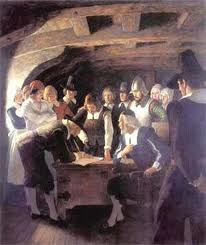 The early Protestants did not wholeheartedly embrace the pursuit of wealth as a virtue. Martin Luther (picutured), reflecting the values of the community he lived in, didn’t consider commerce as real work and disapproved of the hoarding of wealth. He praised manual labour that produced a tangible product but “denigrated the efforts of merchants who produced neither goods nor food.” The idea of buying goods and selling them at a profit without adding to their value in any material way did not fit with Luther’s idea of work and he considered it to be sinful. He felt business people exploited the labour of peasants and artisans. He thought Christians should keep away from “the world of trade, banking, credit, and capitalist industry”. In this Luther held traditional views.
The early Protestants did not wholeheartedly embrace the pursuit of wealth as a virtue. Martin Luther (picutured), reflecting the values of the community he lived in, didn’t consider commerce as real work and disapproved of the hoarding of wealth. He praised manual labour that produced a tangible product but “denigrated the efforts of merchants who produced neither goods nor food.” The idea of buying goods and selling them at a profit without adding to their value in any material way did not fit with Luther’s idea of work and he considered it to be sinful. He felt business people exploited the labour of peasants and artisans. He thought Christians should keep away from “the world of trade, banking, credit, and capitalist industry”. In this Luther held traditional views.
Calvin was more accepting of business activity than Luther but was still concerned about the dangers that wealth could lead to, such as greed, degeneracy and idleness. Calvin differed from his predecessors in his acceptance of money lending or usury as a necessity for commerce and the money-lender as a useful member of society. He allowed that wealth was a sign of God’s blessing for one’s labours.
Both Luther and Calvin condemned as evil, the selfish use of wealth to satisfy personal desires and both disapproved of work aimed at maximising profits. It was some years before business activity was actively supported by Protestants. However, even early Protestants could build up their wealth in good conscience provided it did not lead to “idleness and the temptations of the flesh” nor “distraction from the pursuit of a righteous life.”
The Puritans took this further, “teaching that it is one’s duty to extract the greatest possible gain  from work.” Profits showed that God had blessed a person and approved of their work. In this way seeking wealth became a religiously endorsed activity, which one could pursue in good conscience. The labour and the profit was, however, supposed to be for God, not for one’s own pleasure. So hand in hand with the pursuit of wealth went an ethic of austerity and abstinence, of asceticism. Weber explained:
from work.” Profits showed that God had blessed a person and approved of their work. In this way seeking wealth became a religiously endorsed activity, which one could pursue in good conscience. The labour and the profit was, however, supposed to be for God, not for one’s own pleasure. So hand in hand with the pursuit of wealth went an ethic of austerity and abstinence, of asceticism. Weber explained:
asceticism looked upon the pursuit of wealth as an end in itself as highly reprehensible; but the attainment of it as a fruit of labour in a calling was a sign of God’s blessing. And even more important: the religious valuation of restless, continuous, systematic work in a worldly calling, as the highest means to asceticism, and at the same time the surest and most evident proof of rebirth and genuine faith, must have been the most powerful conceivable lever for the expansion of that attitude toward life which we have here called the spirit of capitalism.
Richard Baxter, one of the better known English Puritan writers, stated in his Christian Directory, a compendium of Puritan ethics: “It is a sin to desire riches as worldlings and sensualists do, for the provision and maintenance of fleshly lusts, and pride. But it is no sin, but a duty to labour not only for labour’s sake, formally resting in the act done, but for that honest increase and provision, which is the end of our labour; and therefore to choose a gainful calling rather than another, that we may be able to do good, and relieve the poor.”